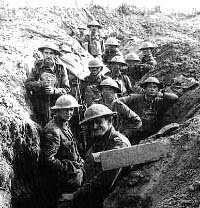 Trouble with the Australians
Trouble with the Australians
In 1918 an average of 9 per 1,000 Australian soldiers in Europe resided in prison.
Among Canadians, New Zealanders and South Africans there was an average of 1.6 per 1,000 men behind bars.
Field-Marshall Douglas Haig was convinced this was due to the low standard of discipline among the Australian divisions.
Picture: Australian soldiers in trenches near Ypres
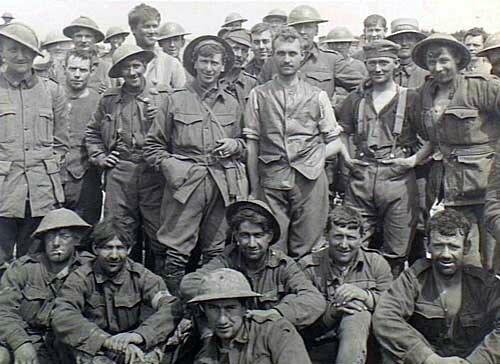
![]() Slovenly ANZAC troops having a day off from the trenches, Western Front
Slovenly ANZAC troops having a day off from the trenches, Western Front
Until this very day military strategists impress on officers the value of discipline among the troops. Almost unanimously is the thought that only disciplined soldiers are ready for war. Undisciplined men are disobedient troublemakers. They can't be trusted and they won't fight well.
It seems that one of the great experiences of the First World War - and a true heritage of that Great War - is going to be forgotten. This Australian lesson is worth to be remembered - not only in Australia, and not only in military circuits.
The Australian lesson learns that discipline has nothing to do with dedication, and very little with training. The keywords in this lesson are: collective discipline and individualism - words that sound like curses in the ears of many a commanding officer.
Reputation
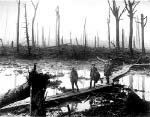 In the First World War the Australian soldiers earned a outstanding reputation. They fought in many of the great theatres of war: Gallipoli, Damascus, Gaza, Somme (Pozières), Fromelles, Péronne, St. Eloi, Ypres (click on the picture right) and Passchendaele.
In the First World War the Australian soldiers earned a outstanding reputation. They fought in many of the great theatres of war: Gallipoli, Damascus, Gaza, Somme (Pozières), Fromelles, Péronne, St. Eloi, Ypres (click on the picture right) and Passchendaele.
Right from the beginning English officers complained about the undisciplined behaviour of the Australians. Their officers and soldiers did not keep the necessary distance, they dressed improperly, even with nonchalance - some didn't even shave everyday. And some soldiers even dared to object if they had to carry out a task they did not like.
The rumours very soon reached the War Cabinet and the Prime Minister in London. It was obvious: with these dirty and slovenly troops you can't win a war.
As soon as the Australians were engaged in their first major battle - at Gallipoli - the War Cabinet send their Secretary, Sir Maurice Hankey, down to investigate what was going on. Sir Maurice visited every corner of the peninsula and he spent a good deal of time in the Australian trenches, even in the front line. He was impressed, and he wrote to the Prime Minister:
"I do hope that we shall hear no more of the 'indiscipline' of these extraordinary Corps, for I don't believe that for military qualities of every kind their equal exists. Their physique is wonderful and their intelligence of a high order."
In France
At Gallipoli the Aussies were landed at the wrong beach and suffered terrible casualties in a rugged and confined war theatre. But it was worse in France where, in hellish conditions, the young men were led to pure slaughter. But there too, they fought like no one had ever seen before.
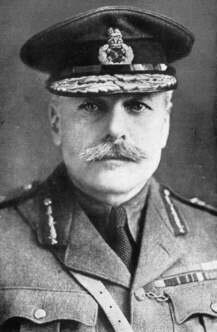 The Australians began to arrive in France from the Middle East in March 1916. At the end of that month Commander-
The Australians began to arrive in France from the Middle East in March 1916. At the end of that month Commander-
Afterwards Haig wrote in his diary: "The men were looking splendid, fine physique, very hard and determined-
The Australians had their first battle experience on European soil on July 20th, in the Battle of the Somme. They took the village of Pozières. However, their claim to reach the Windmill proved untrue. Prompt German counter-
Haig wrote: "The situation seems all very new and strange to Australian HQ. The fighting here and the shell-
The Australians, like their British comrades, were learning the art of war the hard way. They learned amazingly fast - and their morale stayed terrific. More than once Haig intervened personally when he thought the Aussies were going too fast.
Haig in his diary: "The Australians had said at the last moment that they would attack the Windmill again without artillery support and that 'they did not believe machine-
Behaviour
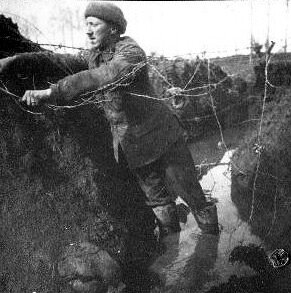 In the trenches (picture right) ignorance and innocence soon died, together with numerous men. An Australian soldier wrote home:
In the trenches (picture right) ignorance and innocence soon died, together with numerous men. An Australian soldier wrote home:
"There, dead lay everywhere. The deeper one dug the more bodies one exhumed. Hands and faces protruded from the slimy toppling walls of trenches. Knees, shoulders and buttocks poked from the foul morass..."
And the German learned to fear Australians, because they were reckless, ruthless - and revengeful. During the Third Battle of Ypres, autumn 1917, the ANZAC's (Australian and New Zealand Army Corps) met the Germans on high ground, in front of Polygon Wood. That evening the official communique read:
One ANZAC Corps obtained all its objectives and took 3.900 prisoners. The other ANZAC Corps took all its objectives and met the Prussian Guards who they had met before at Pozières on the Somme. This Corps took no prisoners.
One of the fierce Aussie soldiers who fought at Polygon Wood was Barney Hines, known as the Souvenir King due to his escapades of robbing the German dead. Apparently even the Kaiser heard of him and branded him a "barbarian... typical of Australian Troops on the Western Front".
But private Hines was of Irish descent and born in Liverpool. When the Great War broke out he was working in a sawmill in Australia. Despite being in his early 40s, he tried to enlist but was turned down on medical grounds. Undeterred, he haunted recruting centres until he was accepted. Hines became one of the legends of the Great War. He generally disdained conventional weapons such as his Lee Enfield rifle preferring to go into action with two sandbags packed with Mills bombs (hand grenades).
There are other accounts of downright cruelty - even warcrimes - committed by Australians against the enemy. The British officer Robert Graves quotes (in Goodbye to all that, 1929) an anonymous Australian who told him: 'Well the biggest lark I had was at Morlancourt, when we took it the first time. There were a lot of Jerries in a cellar, and I said to 'em: "Come out, you Camarades!" So out they came, a dozen of 'em, with their hands up. "Turn out your pockets," I told 'em. They turned 'em out. Watches and gold and stuff, all dinkum. Then I said: "Now back to your cellar, you sons of bitches!" For I couldn't be bothered with 'em. When they were all safely down I threw half a dozen Mills bombs in after 'em. I'd got the stuff all right, and we weren't taking prisoners that day.'
It is uncertain whether stories like this ever reached the staff. But they sure contributed to the reputation of the Australian soldier.
Admiration
As the war continued Field-
During Third Ypres lieutenant P. King of the 2/5th Btn. East Lancashire Regiment, was stuck with a small left-over of his company in the mud near Poelcapelle. The men were exhausted, had been under constant fire for two days and desperate for relieve. But no one seemed even to know that they were there.
LT. King already began to wonder whether his company had been secretly chosen to be a suicide force. King:
"Suddenly, to my great surprise, I heard voices behind me and I looked back and there were three very tall figures, and one was actually smoking. I could hardly speak for astonishment. I said, 'Who the hell are you? And put that cigarette out, you'll draw fire!' He just looked back at me. 'Well, come to that, who are you?' I said, 'I'm lieutenant King of the 2/5th East Lancashire Regiment.' At which he said: 'Well, we're the Aussies, chum, and we've come to relieve you.' And they jumped down into the shell-hole.
Well, naturally, we were delighted, but of course there are certain formalities you've always got to carry out when you hand over, and I was a bit worried about that. So I explained, 'There are no trenches to hand over, no rations, no ammunition, but I have got a map. Do you need any map references?' He said, 'Never mind about that, chum. Just fuck off.'
They didn't seem to be a bit bothered. The last I saw of them they were squatting down, rifles over their shoulders, and they were smoking, all three of them. Just didn't care!"
'So much trouble'
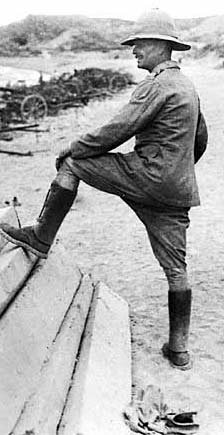 Behind the lines, the Australians had modes of behaviour which conflicted totally with the British Army's habits. In February 1918 Haig wrote in a letter to his wife:
Behind the lines, the Australians had modes of behaviour which conflicted totally with the British Army's habits. In February 1918 Haig wrote in a letter to his wife:
"We have had to separate the Australians into Convalescent Camps of their own, because they were giving so much trouble when along with our men and put such revolutionary ideas into their heads."
Haig was convinced that a great deal of the problems were caused by General Birdwood's relaxed disciplinary methods. Sir William Birdwood (picture right) was Imperial (English officer who commanded the I ANZAC Corps and later the Australian Corps) and he never found great favour in Haig's eyes.
The truth is that Birdwood was one of the very few senior British officers who possessed the 'touch' to command Australians, the perception necessary to extract their qualities.
Another 'troublemaker' was the Australian brigadier-general Thomas William Glasgow. Passed into a proverb are his remarks when he was ordered to attack Villers-Bretonneux, a French village vital to the integrity of the whole Allied line. General Heneker told him that the attack was to be made from Cachy.
Glasgow, who had studied the scene, said he could not do it that way, because that would cost too many lives. "Tell us what you want us to do, Sir," he said, "but you must let us do it our own way."
General Heneker was flabbergasted, especially when Glasgow also said that he wanted the time of the attack changed. British army officers were not supposed to argue with their superiors. But after some arguing it was settled that the attack should be made as Glasgow desired (the attack became a resounding success).
Goal
Another important difference between Australian and British troops was that the Aussie officers explained extensively to their men the objectives of the battle they were about to engage in. Even ordinary soldiers then knew the strategy that was behind it. When they became cut-off they still knew what to do, what the goal was.
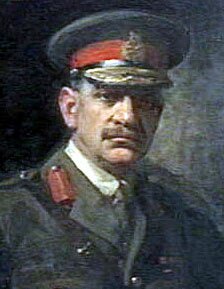 Unlike their British colleagues, common Australian soldiers were not treated like ignorant donkeys, but like individuals who will function better in a team when they know their collective aim. The Australian lieutenant-
Unlike their British colleagues, common Australian soldiers were not treated like ignorant donkeys, but like individuals who will function better in a team when they know their collective aim. The Australian lieutenant-
"Very much and very stupid comment has been made upon the discipline of the Australian soldier. That was because the very conception and purpose of discipline have been misunderstood. It is, after all, only a means to an end, and that end is the power to secure co-ordinated action among a large number of individuals for the achievement of a definite purpose. It does not mean lip service, nor obsequious homage to superiors, nor servile observance of forms and customs, nor a suppression of individuality... the Australian Army is a proof that individualism is the best and not the worst foundation upon which to build up collective discipline."
Strazeele
An example of the clashes between the two conceptions is what happened at the camp in Strazeele (Belgium), where the Australians were encamped on the other side of the road from the 10th Royal Fusiliers. The Tommies were simultaneously shocked and impressed by the Aussies' casual attitude to war - or at least to the Army. It could hardly be right for Aussie privates to address their commanding officer as 'Jack', but the Fusiliers heard them do so with their own ears.
For their part, the Australian 'Diggers' as they were often called, were equally disapproving of certain rites observed by the Fusiliers. As private C. Miles of the 10th Btn. Royal Fusiliers recalled:
"The Colonel decided that he would have a full dress parade of the guard mounting. Well, the Aussies looked over at us amazed. The band was playing, we were all smartened up, spit and polish, on parade, and that happened every morning. We marched up and down, up and down.
The Aussies couldn't get over it, and when we were off duty we naturally used to talk to them, go over and have a smoke with them, or meet them when we were hanging about the road or having a stroll. They kept asking us: 'Do you like this sort of thing? All these parades, do you want to do it?' Of course we said, 'No, of course we don't. We're supposed to be on rest, and all the time we've got goes to posh up and turn out on parade.' So they looked at us a bit strangely and said, 'OK, cobbers, we'll soon alter that for you'.
The Australians didn't approve of it because they never polished or did anything. They had a band, but their brass instruments were all filthy. Still, they knew how to play them.
The next evening, our Sergeant-Major was taking the parade. Sergeant- Major Rowbotham, a nice man, but a stickler for discipline. He was just getting ready to bawl us all out when the Australians started with their band. They marched up and down the road outside the field, playing any old thing. There was no tune you could recognise, they were just blowing as loud as they could on their instruments. It sounded like a million cat- calls.
And poor old Sergeant Rowbotham, he couldn't make his voice heard. It was an absolute fiasco. They never tried to mount another parade, because they could see the Aussies watching us from across the road, just ready to step in and sabotage the whole thing. So they decided that parades for mounting the guards should be washed out, and after that they just posted the guards in the ordinary way as if we were in the line."
Wagon wheel
To the Australian troops it seemed that the British Army was obsessed by discipline. They would never stood for it. At several occasions Australian soldiers sabotaged First Field Punishment British soldiers were sentenced to ( for instance when Tommy had been found drunk or had been wearing dirty clothes when off duty ).
First Field Punishment meant that the soldier first had to parade in full pack. Then he had to take the pack off and Military Policemen strapped him up against a wooden cross, often one in a wagon wheel. It looked like he was crucified. This happened twice a day, an hour in the morning and an hour at night, and for as many days as the soldier was sentenced to.
It happened that Australian troops, incensed by the sight of a man undergoing Field Punishment, cut the man loose again, and again, and threatening the MP's - with loaded rifles, daring them to truss poor Tommy up again.
No executions
The British Army Staff did not very well know what to do with these and other Australian crimes. The mutinies in the French Army made some high-ranking officers nervous. They feared that the casual and highly self-conscious attitude of the ANZAC troops would have a deleterious effect on the more docile British troops under their command. "Independent thinking is not to be encouraged in a professional Army. It is a form of mutiny. Obedience is the supreme virtue", the British Prime Minister Lloyd George warned.
In the British assessment the reputedly high crime rate of the Australians also played a significant role. A rather high number of Aussies were put behind bars for some time. In the winter of 1918 an average of 9 per 1,000 Australian soldiers resided in prison. Canadians, New Zealanders and South Africans had an average of 1.6 per 1,000 men behind bars.
Some punishments however were not forced down on Australian troops. Though liable to be executed for mutiny, desertion to the enemy or treachery, the 129 Australians (including 119 deserters) that were sentenced to death during the war (117 in France) were not shot.
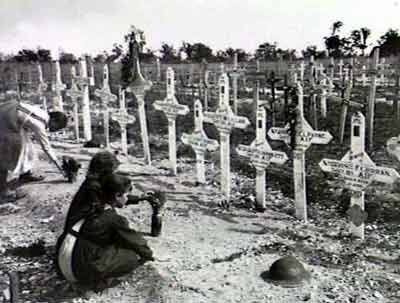 The 1903 Australian Defence Act stipulated that the Governor General of Australia had to confirm all sentences passed by courts-
The 1903 Australian Defence Act stipulated that the Governor General of Australia had to confirm all sentences passed by courts-
A major consideration was the Australian soldier's status as a volunteer, and that as such, these men should not be subject to the extreme penalty.
After all - enough men were killed already. More than 61.000 Australians died in this war, mostly on the Western Front.
Australia's casualty rate was, relatively, the highest of all allied nations.
Picture: French children attending Australian graves.
+++
Sources for this article / Bronnen voor dit artikel.

![]() We have two typical Australian war poems: Christmas Day on the Somme, by Leslie George Rub; and We'll find the reason for Pozieres, by Oscar Walters.
We have two typical Australian war poems: Christmas Day on the Somme, by Leslie George Rub; and We'll find the reason for Pozieres, by Oscar Walters.
![]() Click here for a more realistic assessment of the ANZAC part in the Gallipoli battle.
Click here for a more realistic assessment of the ANZAC part in the Gallipoli battle.
![]() We have more than 50 pictures of the ANZAC forces in Flanders and in Palestine, made by Frank Hurley, nicknamed the Mad Photographer.
We have more than 50 pictures of the ANZAC forces in Flanders and in Palestine, made by Frank Hurley, nicknamed the Mad Photographer.
![]() Return to the frontpage of the Heritage of the Great War.
Return to the frontpage of the Heritage of the Great War.